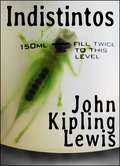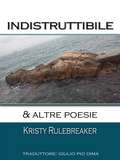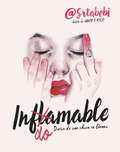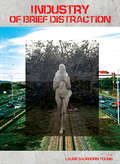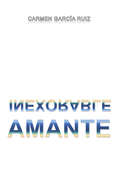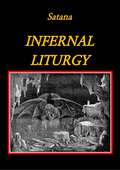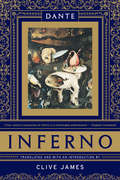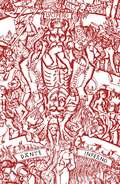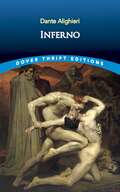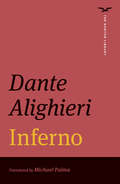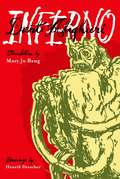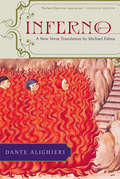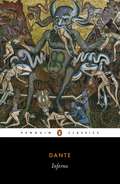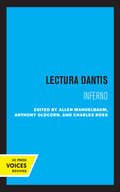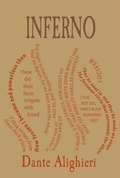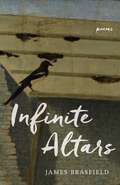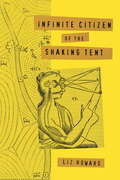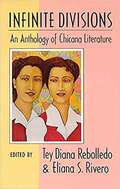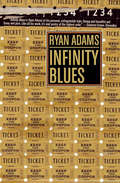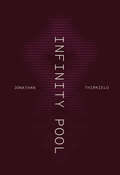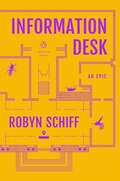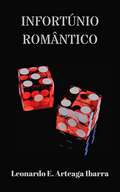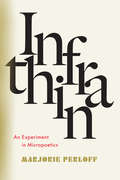- Table View
- List View
Indistintos
by John Kipling Lewis Ezio CardozoIndistintos é uma série de contos em estilo rápido e direto e poemas repletos de imagens surreais. Do policial que vai à mesma padaria todos os dias ao 'faxineiro' de uma espécie inusitada de estabelecimento o que vemos são figuras nas quais esbarramos todos os dias, às vezes sem saber o que se passa em suas mentes (quase sempre) doentias. Indistintos fala da realidade, da realidade que John K. Lewis criou com os filtros que tem na cabeça. Da realidade de um homem cuja realidade o perturba. Ou pelo menos é o que ele quer que você pense.
Indistruttibile & altre poesie
by Kristy Rulebreaker Giulio Pio Dima"Indistruttibile & altre poesie" è la seconda collezione di poesie di Kristy Rulebreaker. Descrive la vita multicolorata come è, a volte amara, a volte dolce. Riguarda le persone, luoghi, odio, amore, giustizia, natura, etc. Più di tutto, riguarda la libertà e il coraggio. Esso incoraggia te, non importa quanto può essere dura la vita, resta indistruttibile.
Indomable: Diario de una chica en llamas
by Bebi Fernández@Srtabebi, el fenómeno superventas de poesía y la voz más irreverente de Twitter, regresa con un nuevo libro incendiario: #Indomable. Si estás leyendo esto, probablemente seas una o un inflamable. El porqué, ya lo entenderás. Ahora ojéalo:Esto no es un libro, es una granada. Que empiecen las explosiones.
Indomable: Diario de una chica en llamas
by SrtaBebi@Srtabebi, el fenómeno superventas de poesía y la voz más irreverente de Twitter, regresa con un nuevo libro incendiario: #Indomable. Si estás leyendo esto, probablemente seas una o un inflamable. El porqué, ya lo entenderás. Ahora ojéalo:Esto no es un libro, es una granada. Que empiecen las explosiones.
Industry of Brief Distraction
by Laurie Saurborn YoungIn a voice at once direct, musical, and surreal, these poems document the journey of a woman as she examines her role in both the political landscape of modern American culture and within the scope of her familial history. Addressing modern environmental concerns and global destruction, the poems maintain a connection with a larger literary history as well as the author's personal history. Sometimes grounded in the concrete, physical world, sometimes floating in imaginative abstraction, this book unveils a version of the America we live in, this industry of brief distraction.
Inexorable amante
by Carmen García RuizPODRÍAMOS SER INFINITOS, ¿Y SI LO FUÉRAMOS? <P><P>En estos versos, Carmen García nos muestra su percepción sensible de la vida con la excusa de Fuerteventura. <P>Un pretexto literal, ya que previo al texto estaba la isla que siente y defiende como propia y en la que reside desde hace diez años. <P><P>Con el paisaje de su Mancha natal (Puertollano, 1976) en la retina, Carmen García nos habla de sus pasiones y obsesiones, de lo que la atraviesa de parte a parte; donde la búsqueda del horizonte, en un cielo siempre con aves, no es sino metáfora o expresión de lo inexorable elevado aquí a concepto existencial.
Infernal Liturgy
by Roberto Carlos Pavón Carreón SatanaThe most original poems book of the twenty-first century ...
Inferno
by Anthony Oldcorn Stanley Lombardo Dante Steven BotterillAn attractive new alternative as both a translation and a pedagogical tool. The volume includes an excellent introduction by Dante scholar Steven Botterill (Univ. of California, Berkeley), clear and informative notes by lifelong Dantist Anthony Oldcorn, a concise bibliographical note that indicates some important sources on Dante in print and online, and a diagram of Hell; Index of the Damned lists characters who appear in the canticle. The translator's preface explains Lombardo's choices as he faced the always-challenging task of rendering Dante's poetry into English. Among the most interesting choices are the occasional use of rhyme--especially in key passages and at the end of each canto, where interlocking rhymes that mimic Dante's terza rima are consistently employed--and an emphasis on creating a version that works well as an oral presentation, following the long tradition of private, public, and theatrical readings of the poem. The volume includes the original Italian text, thus facilitating classroom references and comparisons. --Rebecca West (Department of Romance Languages and Literatures, University of Chicago) in Choice
Inferno
by Dante Alighieri Clive James<P>Dante's immortal vision of Hell shines "as it never did before in English verse" (Edward Mendelson) in Clive James's new translation of Inferno. <P>The most captivating part of perhaps the greatest epic poem ever written, Dante's Inferno still holds the power to thrill and inspire. <P>The medieval equivalent of a thriller, Inferno follows Dante and his faithful guide, Virgil, as they traverse the complex geography of Hell, confronting its many threats, macabre punishments, and historical figures, before reaching the deep chamber where Satan himself resides. <P>Now, in this new translation, Clive James communicates not just the transcendent poetry of Dante's language but also the excitement and terror of his journey through the underworld. <P>Instead of Dante's original terza rima, a form which in English tends to show the strain of composition, James employs fluently linked quatrains, thereby conveying the seamless flow of Dante's poetry and the headlong momentum of the action. <P>As James writes in his introduction, Dante's great poem "can still astonish us, whether we believe in the supernatural or not. At the very least it will make us believe in poetry."
Inferno
by DanteDiscover Dante's original Inferno in this modern and acclaimed Penguin translation. Describing Dante's descent into Hell with Virgil as a guide, Inferno depicts a cruel underworld in which desperate figures are condemned to eternal damnation for committing one or more of seven deadly sins. As he descends through nine concentric circles of increasingly agonising torture, Dante encounters many doomed souls before he is finally ready to meet the ultimate evil in the heart of Hell: Satan himself.This new edition of Inferno includes explanatory notes and an illustration of Dante's plan of hell. Robin Kirkpatrick's masterful translation is also available in a bilingual Penguin edition, with the original Italian on facing pages, and in a complete edition of The Divine Comedy with an introduction and other editorial materials. Dante Alighieri was born in 1265. He studied at the university of Bologna, married at the age of twenty and had four children. His first major work was La Vita Nuova (1292), a tribute to Beatrice Portinari, the great love of his life who had died two years earlier. In 1302, Dante's political activism resulted in his being exiled from Florence. After years of wandering, he settled in Ravenna and in about 1307 began writing The Divine Comedy. Dante died in 1321.Robin Kirkpatrick is a poet and widely-published Dante scholar. He has taught courses on Dante's Divine Comedy in Hong Kong, Dublin and Cambridge, where is Fellow of Robinson College and Professor of Italian and English Literatures.'The perfect balance of tightness and colloquialism...likely to be the best modern version of Dante' - Bernard O'Donoghue
Inferno
by Dante Alighieri Henry Wadsworth LongfellowEnter the unforgettable world of The Inferno and travel with a pair of poets through nightmare landscapes of eternal damnation to the very core of Hell. The first of the three major canticles in La divina commedia (The Divine Comedy), this fourteenth-century allegorical poem begins Dante's imaginary journey from Hell to Purgatory to Paradise. His encounters with historical and mythological creatures--each symbolic of a particular vice or crime--blend vivid and shocking imagery with graceful lyricism in one of the monumental works of world literature.This acclaimed translation was rendered by the beloved nineteenth-century poet, Henry Wadsworth Longfellow. A skilled linguist who taught modern languages at Harvard, Longfellow was among the first to make Dante’s visionary poem accessible to American readers.
Inferno (The Norton Library #0)
by Dante AlighieriAbout Michael Palma’s translation Michael Palma’s translation of the Inferno reproduces in contemporary English Dante’s intricate triple-rhyming terza rima form, defying the conventional wisdom of literary commentators who long argued that it simply cannot be done. This spectacular feat of poetic artistry— “accurate … admirably clear, and readable” (Richard Wilbur)—“in capturing the sense, sound, and spirit of the original … comes close to perfection” (X.J. Kennedy).
Inferno: A New Translation
by Dante Alighieri Henrik Drescher Mary Jo BangAn innovative and fascinating new version of Dante Alighieri'sInferno as it has never been rendered Stopped mid-motion in the middle Of what we call a life, I looked up and saw no sky- Only a dense cage of leaf, tree, and twig. I was lost. --from Canto I Award-winning poet Mary Jo Bang has translated theInferno into English at a moment when popular culture is so prevalent that it has even taken Dante, author of the fourteenth century epic poem,The Divine Comedy, and turned him into an action-adventure video game hero. Dante, a master of innovation, wrote his poem in the vernacular, rather than in literary Latin. Bang has similarly created an idiomatically rich contemporary version that is accessible, musical, and audacious. She's matched Dante's own liberal use of allusion and literary borrowing by incorporating literary and cultural references familiar to contemporary readers: Shakespeare and Dickinson, Freud and South Park, Kierkegaard and Stephen Colbert. The Inferno--the allegorical story of a spiritual quest that begins in a dark forest, traverses Hell's nine circles, and ends at the hopeful edge of purgatory--was also an indictment of religious hypocrisy and political corruption. In its time, the poem was stunningly new. Bang's version is true to the original: lyrical, politically astute, occasionally self-mocking, and deeply moving. With haunting illustrations by Henrik Drescher, this is the most readable Inferno available in English, a truly remarkable achievement.
Inferno: A New Verse Translation
by Dante Alighieri Michael Palma"Palma's wonderfully readable translation comes close to perfection. I'm tempted to call it a miracle."--X. J. Kennedy Unlike every known translator before him, Michael Palma re-creates Dante's masterpiece in all its dimensions, without emphasizing some aspects over others, rendering Inferno into contemporary American English while maintaining Dante's original triple rhyme scheme. The result is a translation that can be appreciated for its literal faithfulness and beautiful poetic form, accompanied by facing-page Italian and explanatory notes. "A superb translation; highly recommended."--Library Journal "I find Michael Palma's Inferno to be one that I'm having a hard time improving."--Lawrence Ferlinghetti "I think highly of Michael Palma's Inferno....Readers will find it admirably clear and readable."--Richard Wilbur
Inferno: Inferno
by DanteDescribing Dante's descent into Hell midway through his life with Virgil as a guide, Inferno depicts a cruel underworld in which desperate figures are condemned to eternal damnation for committing one or more of seven deadly sins. As he descends through nine concentric circles of increasingly agonising torture, Dante encounters doomed souls including the pagan Aeneas, the liar Odysseus, the suicide Cleopatra, and his own political enemies, damned for their deceit. Led by leering demons, the poet must ultimately journey with Virgil to the deepest level of all. For it is only by encountering Satan, in the heart of Hell, that he can truly understand the tragedy of sin.
Inferno: Lectura Dantis (Lectura Dantis #1)
by Allen Mandelbaum Anthony Oldcorn Charles RossThis title is part of UC Press's Voices Revived program, which commemorates University of California Press’s mission to seek out and cultivate the brightest minds and give them voice, reach, and impact. Drawing on a backlist dating to 1893, Voices Revived makes high-quality, peer-reviewed scholarship accessible once again using print-on-demand technology. This title was originally published in 1998.
Inferno: Poema - Primary Source Edition (Wordsworth Classics)
by Dante Alighieri Henry Wadsworth LongfellowOn a divine journey through the depths of Hell, Dante--with his guide, the poet Virgil--witnesses the fate of Earth's sinners. Inferno, a 14th century poem and the first part of Dante Alighieri's The Divine Comedy, paints an allegorical underworld in which sinners are punished in accordance with their sins. Journey through the darkness and meet famous historical and mythical figures and the fate that has become them, from Homer and Julius Caesar who dwell in Limbo with the unbaptized and the virtuous pagans, to Judas Iscariot and Satan himself, who dwell in the deepest circle of hell for the sin of treachery. Influential, even after seven centuries in print, readers of Inferno will appreciate the plethora of allusions both within and concerning this work, as well as the moral implications the story develops. Now available as part of the Word Cloud Classics series, Inferno is a must-have addition to the libraries of all classic literature lovers.
Infinite Altars: Poems
by James BrasfieldIn his second poetry collection, Infinite Altars, James Brasfield tracks restless interplays of light on a fallen feather outside an Italian chapel, the surface of the Gowanus Canal, and a forest footpath after an evening of rain. Atmospheric and reflective, these poems travel with equal ease through the world of fine arts and the places where we live, highlighting the vivid sights and sounds of each in turn. At a sudden encounter with everyday beauty, serenity suffuses through the author: "Something of that calmness goes with us / back into the world." Brasfield's poems invite readers to embrace these unexpected and arresting experiences.
Infinite Citizen of the Shaking Tent
by Liz HowardA stunning debut book of poems from a bold new voice unafraid to engage with the exigencies of our contemporary world. In Liz Howard's wild, scintillating debut, the mechanisms we use to make sense of our worlds - even our direct intimate experiences of it - come under constant scrutiny and a pressure that feels like love. What Howard can accomplish with language strikes us as electric, a kind of alchemy of perception and catastrophe, fidelity and apocalypse. The waters of Northern Ontario shield country are the toxic origin and an image of potential. A subject, a woman, a consumer, a polluter; an erotic force, a confused brilliance, a very necessary form of urgency - all are loosely tethered together and made somehow to resonate with our own devotions and fears; made "to be small and dreaming parallel / to ceremony and decay." Liz Howard is what contemporary poetry needs right now.From the Trade Paperback edition.try, of being formed by a staggeringly wild landscape and then residing in a city, of striving for certainty and exactitude through science and ultimately embracing the expansive potential of poetry.
Infinite Divisions: An Anthology Of Chicana Literature
by Tey Diana Rebolledo Eliana S. RiveroGiven the explosive creativity shown by Chicana writers over the past two decades, this first major anthology devoted to their work is a major contribution to American letters. It highlights the key issues, motifs, and concerns of Mexican American women from 1848 to the present, and particularly reflects the modern Chicana's struggle for identity. Among the recurring themes in the collection is a re-visioning of foremothers such as the historical Malinche, the mythical Llorona, and pioneering women who settled the American Southwest from the sixteenth to twentieth centuries. Also included are historical documents on the lives, culture, and writings of Mexican American women in the nineteenth century, as well as oral histories recorded by the Federal Writers Project in the 1930s. Through poetry, fiction, drama, essay, and other forms, this landmark volume showcases the talents of more than fifty authors, including Gloria E. Anzaldúa, Ana Castillo, Lorna Dee Cervantes, Denise Chávez, Sandra Cisneros, Pat Mora, Cherríe Moraga, and María Helena Viramontes.
Infinity Blues
by Ryan Adams&“A passionate, arresting, and entertaining book of verse . . . The images are vivid and the voice is honest and powerful&” (Stephen King). This is the debut collection of poetry by singer/songwriter Ryan Adams, acclaimed for albums including Cardinology, Cold Roses, and Prisoner. His work in this volume rings with emotional authenticity—and provides perhaps an even deeper insight into the man than is revealed through the songs that have resonated with fans the world over. &“Ryan Adams writes with equal parts precision and recklessness; the blood he draws from the text is easily as unnerving as its unapologetic tenderness. He is proof that poetry will find its writer.&” —Mary-Louise Parker &“Infinity Blues is Ryan Adams at his personal, unforgettable best. Strong and beautiful and funny and pure. Like all his work, it&’s soul poetry of the highest order.&” —Cameron Crowe &“This is much better than reading a friend&’s journal. It&’s more like watching somebody you love in the bathtub talking to himself. You&’re like, wow, he&’s even good at taking a bath. After reading Infinity Blues (which I think is a great title), I give Ryan Adams the best compliment I ever got—and the only reason for reading anyone&’s poetry. Ryan, I really like your mind.&” —Eileen Myles
Infinity Pool (Phoenix Poets)
by Jonathan ThirkieldMoving through the realms of digital technologies, these poems cut to the core of our physical human experiences amid a virtually mediated world. Diving through illusions and phantoms of virtual realms and into the human desire for boundless possibility, Infinity Pool charts the ways technologies have become embedded in our minds, bodies, and lives. Immersed in a world of data streams, neural nets, spider algorithms, and electronic terminals, Jonathan Thirkield’s poems plumb the dissonances and shrinking distances between ourselves and digital technologies, imagining what becomes of the fragile machinery of the human body amid a rapidly transforming world. Thirkield turns to language as a mediator and explores infinity as a mathematical concept, a multiverse conceit, and a driver of the computational imagination. Traveling across the full spectrum of digital experience—from satellites crossing the edges of our solar system to microscopic bytes that operate beneath our perception—this collection is a testament to the future we imagine ourselves to be living through and to what happens when our escapist desires give way to the realities of birth, loss, parenthood, and sickness. Through lyrical, narrative, and formal mutations, these poems cut through a decade of exponential technological growth, landing in the reality of our corporeal experiences: the isolation of chronic illness, the daunting journeys of children growing up today, and the hope that we can remain connected to each other no matter how tenuous the ties.
Information Desk: An Epic (Penguin Poets)
by Robyn SchiffA book-length poem set in the Metropolitan Museum of Art, from a writer whose work offers &“something few poets ever discover: a vision of the whole world&” (Dan Chiasson, The New Yorker)Robyn Schiff&’s fourth collection is an ambitious book-length poem in three parts set at The Metropolitan Museum of Art&’s information desk, where Schiff long ago held a staff position. Elaborately mapping an interconnected route in and out of the museum through history, material, and memory, Information Desk: An Epic takes us on an anguished soul-quest and ecstatic intellectual query to confront the violent forces that inform the museum&’s encyclopedic collection and the spiritual powers of art.Novelistic in its sweep, frantically informative, and deeply intimate in its private recollections, Information Desk: An Epic wayfares with riveting lyric intensity through an epic array of topics and concerns, including illusion, deception, self-deception, complicity, lecherous coworkers, the composition of pigment, the scattering of seeds, ideas, and capital, and insect infestations spreading within artwork. Along the way, Schiff pauses to invoke three terrifying muses—parasitic wasps—in desperate awe of their powers of precision and generative energy. Information Desk: An Epic undertakes a hemorrhaging ekphrastic journey through artifice and the natural world.
Infortúnio Romântico
by Leonardo E. Arteaga IbarraMinha linguagem metafórica limitada e lamentável é incapaz de descrever o fenômeno que você é. Não serve para representar o fantástico mundo dos sonhos de criaturas aladas, paisagens exuberantes e seres míticos que sua palavra e o império de seus olhos escuros me mostram. Perdi meu tempo escrevendo e compondo expressões desajeitadas de poemas frouxos que com comparações inúteis acabam não sendo nem obras de arte, nem manifestações puras de amor, o que eu poderia dizer sobre você que já não sabe? Qualquer analogia presente é assunto do autor que não vem de Deus ou magia vodu, posso dizer que você é uma flor?, ou que tem luzes que iluminam o céu? Eu me pergunto se estou autorizado a comparar a cor do pôr do sol com o fim da vida, ou o que sinto; Por acaso a primavera é o início e o nascimento?, e outubro e outono anunciam a dor?, é verdade que o mel pode ser comparado com ternura e o tom violeta com o que perdura? Desnecessário dizer sobre a comparação de estrelas distantes com algo tão absurdo como utopia ou, pior, comparar mulheres com poesia, em suma, essas são metáforas banais. É verdade... a poesia se alimenta de metáforas (para algumas pessoas pensarem nelas, leva muitas horas) e rimas são apenas um enfeite do poema, para que me entendam é "adornar". Como dizem os psicanalistas, a criação de metáforas nada mais é do que um sintoma: algumas pistas que explicam o reprimido, algo de que o sujeito lança mão para ser capaz de representar seu desconforto. Gosto de pensar isso, gosto de pensar que a clínica não está tão longe da composição lírica. E que essas criações me permitem tapar o monstruoso buraco psicótico e transformá-lo na miséria de um neurótico pobre, neste caso, um simples infortúnio romântico.
Infrathin: An Experiment in Micropoetics
by Marjorie PerloffEsteemed literary critic Marjorie Perloff reconsiders the nature of the poetic, examining its visual, grammatical, and sound components. The “infrathin” was Marcel Duchamp’s playful name for the most minute shade of difference: that between the report of a gunshot and the appearance of the bullet hole, or between two objects in a series made from the same mold. “Eat” is not the same thing as “ate.” The poetic, Marjorie Perloff suggests, can best be understood as the language of infrathin. For in poetry, whether in verse or prose, words and phrases that are seemingly unrelated in ordinary discourse are realigned by means of sound, visual layout, etymology, grammar, and construction so as to “make it new.” In her revisionist “micropoetics,” Perloff draws primarily on major modernist poets from Stein and Yeats to Beckett, suggesting that the usual emphasis on what this or that poem is “about,” does not do justice to its infrathin possibilities. From Goethe’s eight-line “Wanderer’s Night Song” to Eliot’s Four Quartets, to the minimalist lyric of Rae Armantrout, Infrathin is designed to challenge our current habits of reading and to answer the central question: what is it that makes poetry poetry?
